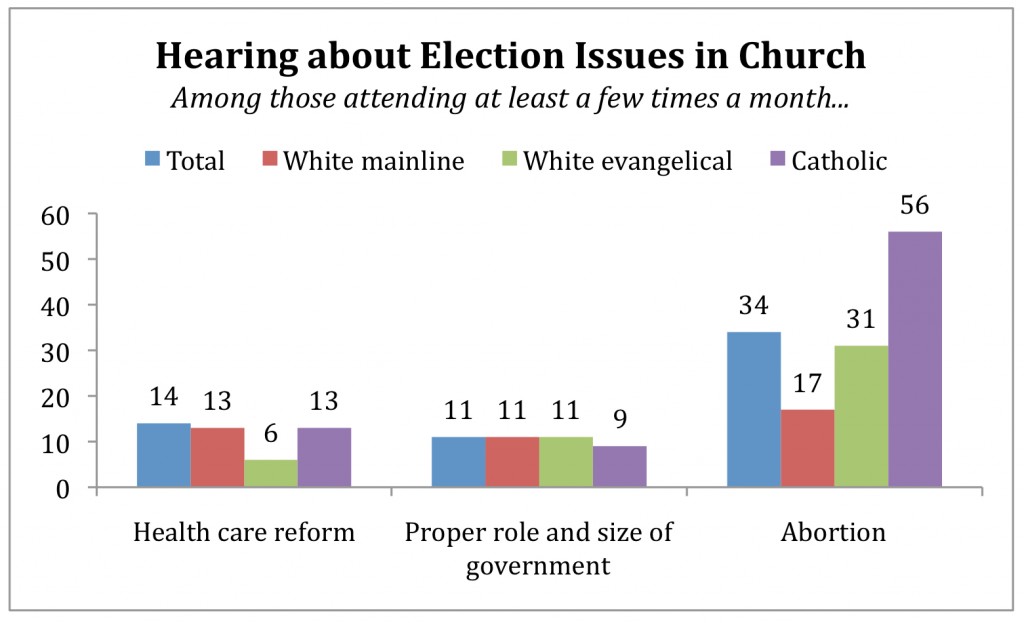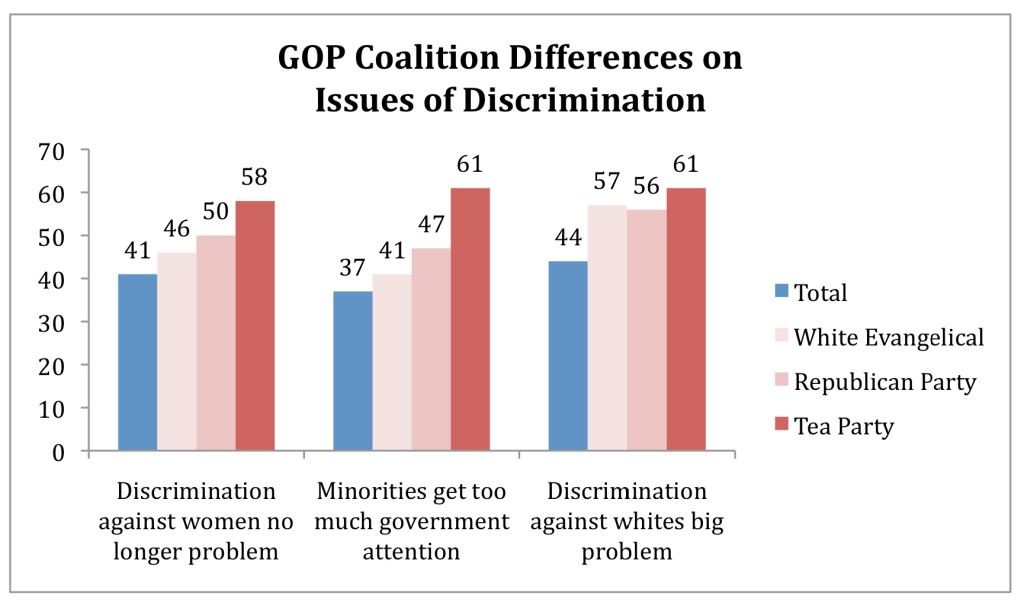Executive Summary
Results of the Post-Election American Values Survey were based on 1,494 callback interviews with respondents from the Pre-election American Values Survey, which was fielded in early September 2010 among a national random sample of 3,013 adults (age 18 and older). Telephone interviews for the Post-Election American Values Survey were conducted in both English and Spanish from November 3-7, 2010.
Among the top findings:
The 2010 midterm election saw no major religious realignments. Republican candidates held a significant advantage among white Christian voters, while Democratic candidates held a significant advantage among minority Christian voters and religiously unaffiliated voters. Few Americans reported feeling excited (9%) about the election outcome. A plurality (41%) reported feeling satisfied, but nearly as many reported feeling disappointed (21%) or worried (18%) about the election outcome. Even among Republican voters, only about 1-in-5 reported feeling excited about the results of the election.
Looking toward 2012, the survey found three significant emerging religious issues to watch: President Obama’s religion dilemma, attitudes toward Islam, and attitudes toward American exceptionalism. These issues represent important new ways in which religion may shape the 2012 elections:
President Obama’s religion dilemma. A majority of Americans say that President Obama has religious beliefs that are somewhat different (16%) or very different (35%) than their own. Only 4-in-10 believe that Obama has similar religious beliefs to their own.
There is a strong relationship between how Americans perceive Obama’s faith and their views toward him. Among Americans who say Obama has religious beliefs very similar to their own, 94% have a favorable view of him, including a majority (51%) who have a very favorable view. At the other end of spectrum, among Americans who say Obama’s beliefs are very different from their own, nearly 8-in-10 say they have a very (51%) or mostly (27%) unfavorable view of him.
Overall, Americans are nearly evenly divided over whether the values of Islam are compatible with American values. Approximately two-thirds of Republicans (67%) and those identifying with the Tea Party movement (66%) say the values of Islam are at odds with American values. Less than one-third of Democrats (30%) agree, and only about 4-in-10 (43%) Independents agree.
A majority (58%) of Americans believe God has granted America a special role in human history. Members of the Tea Party (76%) and Republicans (75%) are much more likely to believe that God has a granted the U.S. a special role in human history than independents (54%) or Democrats (49%).
Americans who believe God has granted America a special role in history are significantly more likely to say military strength rather than diplomacy is the best way to ensure peace, and to say torture can be justified.
The survey also found significant divides over attitudes toward discrimination, particularly over the question of whether whites currently face significant discrimination. Forty-four percent of Americans believe that today discrimination against whites has become as big a problem as discrimination against blacks and other minorities.
A majority of those identifying with the Tea Party (61%) and Republicans (56%) say that discrimination against whites is as big a problem as discrimination against blacks and other minorities, a view shared by only 28% of Democrats and 49% of independents.
White evangelicals are the only religious group in which a majority (57%) agree that discrimination against whites has become as big a problem as discrimination against minorities.
In terms of the direct role of religion, three-quarters (73%) of voters said that compared to previous elections, their faith or religious values played the same role this year in how they voted. Moreover, only about 1-in-10 voters said that their religious beliefs had the biggest influence on their vote. Nearly three-quarters reported that common sense and personal experience had the greatest influence.
Most midterm voters thought the Tea Party helped, more than it hurt, the Republican Party because it energized their base. However, a majority of Democratic voters said that the Tea party hurt the Republican Party by helping nominate candidates with extreme views.
In the months leading up to the election, Americans who attend religious services regularly were much more likely to hear about abortion from their clergy than about health care, the role of government, or particular candidates. Catholics were much more likely to hear about abortion than any other religious group, with 56% reporting hearing their clergy speak out on the issue.
I. The 2010 Election
The 2010 Vote
In the 2010 election for Congress, the Post-election American Values Survey found that 47% of voters supported the Republican candidate in their election district, 42% supported the Democratic candidate, 4% reported voting for a third party candidate, and 7% refused to indicate how they voted.
Republican voters, Tea Party voters, and conservative voters were among the strongest supporters of GOP candidates in their election district (89%, 88%, and 75% respectively). Nearly 9-in-10 (87%) voters who say Fox news is their most trusted news source also voted for GOP candidates. Democratic voters and liberal voters were the strongest supporters of Democratic candidates on Election Day (87% and 79% respectively).
Republican candidates had a significant advantage among white Christians in 2010. White evangelicals (71%), white mainline Protestant voters (56%), and white Catholic voters (56%) preferred Republican candidates by significant margins. Democratic candidates had a significant advantage among minority Christians (68%) and religiously unaffiliated voters (57%).
Three-in-ten Americans reported voting before Election Day, and 7-in-10 voted on Election Day. Among those who voted early, a majority (57%) said they voted by mail. Senior voters (age 65 and older) were most likely to cast early ballots, with 40% voting before Election Day. Among voters under the age of 50, less than 1-in-4 (23%) reported voting early.
There were few undecided voters on Election Day; only 7% of voters reported deciding for whom to vote on Election Day. Republican candidates had a slight advantage over Democratic candidates among voters who made decisions a week before or on Election Day (44% to 41%). But more than 4-in-10 (44%) voters decided how to cast their ballot at least 6 months before Election Day. Among voters who made their decision 6 months before the election or earlier, Republican candidates had a 12-point advantage (53% to 41%).
Voters and Nonvoters
The demographic and political profiles of voters and nonvoters differed significantly in the 2010 election. Compared to the general population, the 2010 electorate was much older, less racially and ethnically diverse, more educated, and more conservative. A majority (54%) of midterm voters were age 50 or older. In contrast, 7-in-10 nonvoters were under the age of 50. Only about 1-in-10 (11%) voters in 2010 were under the age of 30, compared to 37% of nonvoters.
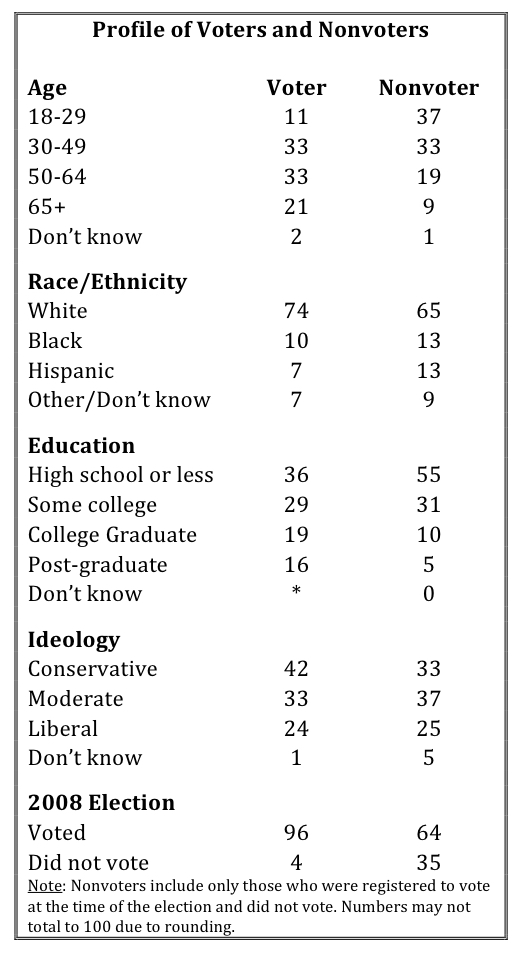 Nearly three-quarters (74%) of voters in 2010 were white, 1-in-10 were African American, and 7% were Hispanic. African Americans and Hispanics made up a much larger proportion of nonvoters at 13% each respectively.
Nearly three-quarters (74%) of voters in 2010 were white, 1-in-10 were African American, and 7% were Hispanic. African Americans and Hispanics made up a much larger proportion of nonvoters at 13% each respectively.
More than 4-in-10 (42%) voters identified politically as conservative, compared to one-third of non-voters. Nearly half (48%) of voters reported identifying with or leaning towards the Republican Party. Among nonvoters, only 36% identified with or leaned towards the GOP.
There is strong evidence that higher turnout among nonvoters would have significantly helped Democratic candidates. In PRRI’s pre-election survey conducted two months before the election, nonvoters indicated strong preferences for Democratic candidates over Republican candidates (46% to 38%). Moreover, nearly two-thirds (64%) of nonvoters reported voting in the presidential election of 2008, and they supported Barack Obama over John McCain by a significant margin (61% to 39%). (1)
Factors Important to Voting
Nearly half (47%) of voters said that the economy was the most important issue for their vote. Nearly 1-in-5 voters (19%) said that health care was most important, followed by the role and size of government (16%). No more than 1-in-20 voters said that immigration (4%), the wars in Iraq and Afghanistan (5%), same-sex marriage (3%), or abortion (3%) were important for how they voted.
There were significant partisan differences in voting priorities. Although both Democratic and Republican voters ranked the economy as the most important voting issue, Democratic voters were more likely to report this than Republican voters (55% to 39%). One-in-four Republican voters said that the size and role of government was the most important issue in the 2010 election, compared to only 3% of Democratic voters. Among voters who identify with the Tea Party movement, nearly as many cited the role and size of government (37%) as cited the economy (40%) as the most important factor in their vote.
Overall, the economy was clearly the dominant issue in the 2010 election. Among voters who reported the economy was most important to their vote, the survey asked a follow-up question about what specific economic issue mattered most. Nearly half said that the lack of jobs was the most important economic issue. Nearly equal numbers reported that the budget deficit (15%) and the gap between rich and poor (16%) were the most important economic issues. Roughly 1-in-10 (12%) said that taxes (8%) and bailouts of the financial industry were the most important economic issues.
After the economy, the two issues that mattered most to voters were health care and the size and role of government. Four-in-ten voters said that health care was the second most important issue to their vote, and 27% said the size and role of government was the next most important issue after the economy.
The Direct Influence of Religion
Nearly three-quarters (73%) of voters said that compared to previous elections, their faith or religious values played the same role this year in how they decided to vote. Nearly equal numbers of voters said that faith played a larger role this year (6%) as said it played a smaller role (8%). Thirteen percent said that faith and religious values played no role in their vote choice.
Compared to other factors, most voters did not report that religion was the biggest influence on their vote. Nearly three-quarters (73%) reported that common sense and personal experience had the biggest impact on how they voted. Nearly equal numbers reported that what they had seen or read in the media (12%) or their religious beliefs (9%) had the biggest influence on their voting decisions. Four percent said the views of their friends and family had the greatest impact.
Among religious groups, white evangelicals were the most likely to say their religious beliefs were the biggest influence on their vote (20%), roughly double the level of any other religious group.
Purpose of Vote & Influence of the Tea Party
Voters who selected Republican and Democratic candidates had distinct reasons for doing so. Among voters who selected Republican candidates, a majority said their vote was to help the Republican Party win control of Congress (27%) or to express opposition to President Obama (27%). Nearly 3-in-10 said their vote was a vote against Washington in general (27%). Only 14% said their vote was primarily about local issues. Among voters who supported Democratic candidates, nearly two-thirds said their vote was to help the Democrats retain control of Congress (33%) or to show support to President Obama (32%). More than 1-in-5 (21%) said their vote was mostly about local issues. Only 9% said it was a vote against the Tea Party.
There were some important differences in voting motivations between Republican voters overall and Tea Party voters who supported Republican candidates. Republican voters were more likely to say their vote was a vote to help the Republican Party win control of Congress (37%) rather than to oppose President Obama (25%), while voters identifying with the Tea Party movement were more likely to say their vote was a vote to express opposition to President Obama (37%) than to help the Republican Party (28%).
Most midterm voters thought the Tea Party helped, more than it hurt, the Republican Party. More than 6-in-10 (61%) voters said the Tea Party helped the Republican Party because it helped energize its core supporters, compared to 32% who said the Tea Party hurt the GOP because it helped nominate candidates with extreme views.
Republican voters overwhelmingly viewed the Tea Party as a positive development. Nearly 8-in-10 (78%) said the Tea Party helped the GOP by helping energize core supporters. A slim majority (52%) of Democratic voters said the Tea Party hurt the GOP by helping to nominate candidates with extremist views. More than 9-in-10 (91%) of those identifying with the Tea Party said they helped the Republican Party, and more than 7-in-10 (72%) white evangelical voters also agreed the Tea Party was a boon to the GOP.
What Americans were Hearing in Church Before the Election
Although very few Americans said the issue of abortion was an important factor in their vote, more Americans who attend religious services regularly (at least a few times a month) reported hearing about abortion in their place of worship (34%) than about other issues like health care reform (14%) and the proper role and size of government (11%) in the months leading up to the election.
n the issue of abortion, there were dramatic differences in what religious groups reported hearing leading up to the election. A majority (56%) of Catholics—including nearly two-thirds (65%) of white Catholics—said that they heard about the issue of abortion from their clergy in the months leading up to the election, a rate nearly twice that of any other religious group. In contrast, 33% of minority Christians, 31% of white evangelicals, and only 17% of white mainline Protestants reported hearing about the issue of abortion leading up to the election.
Only about 1-in-10 (9%) Americans reported that the clergy at their place of worship spoke out in support of or opposition to a particular political candidate or party. On this question there were no significant differences between religious groups.
II. Beyond the Election: Reactions and Priorities
Feelings About Election Outcome
Despite the substantial gains made by the Republican Party in Congress, few Americans are excited about the outcome of the election. Less than 1-in-10 (9%) report feeling excited about election results. A plurality (41%) report feeling satisfied. Nearly as many Americans say they feel disappointed (21%) or worried (18%) about the election outcome as report feeling satisfied.
The level of excitement about the election is not significantly different among voters. Even among Republican voters, while 59% report being satisfied, only about 1-in-5 (22%) say they are excited about the results. More than two-thirds of Democratic voters report feeling either disappointed (46%) or worried (22%). Among all groups, Tea Party voters are most excited about the results of the 2010 election, but even among this group, more report being satisfied (54%) than excited (30%).
Priorities for Republicans and Democrats in 2011
Republicans and Democrats have different priorities for the new Congress. Republicans say the most important priorities for the new GOP majority in Congress should be repealing the health care reform law passed last year (36%) and balancing the federal budget (29%). Only 8% of Republicans report that investigating wrongdoing by the Obama administration should be the most important priority for the GOP, and only 6% say that cutting spending on social services should be the top priority. Those identifying with the Tea Party are about twice as likely to say the top priority should be repealing the health care reform law as balancing the budget (41% to 23% respectively). Only 4% of Americans who identify with the Tea Party report that investigating the Obama administration should be the top priority for Republicans in Congress.
Among independents who lean towards the GOP or voted for Republican candidates in 2010, 32% report that balancing the federal budget should be the most important priority for GOP members of Congress, and 33% report that repealing the health care law should be the top priority.
Seven-in-ten Democrats say the most important priorities for Obama and congressional Democrats should be ensuring the health care law is fully funded (40%) and cutting taxes for Americans making less than $250,000 a year (30%). About 1-in-10 (11%) Democrats say the most important priority for Obama and Democratic members of Congress should be passing another stimulus bill. Less than 1-in-10 say passing comprehensive immigration reform (8%) or passing climate change legislation (5%) should be top priorities.
Among independents who lean towards the Democratic Party or voted for Democratic candidates, one-third say cutting taxes for Americans making less than $250,000 a year should be the top priority for Democrats and the Obama administration. Twenty-nine percent say fully funding the health care law should be the most important priority.
III. Looking Ahead to 2012: Emerging Fault Lines
President Obama’s Religion Dilemma
Only 4-in-10 Americans believe that President Obama has similar religious beliefs to their own. A majority say that Obama has religious views that are somewhat different (16%) or very different (35%) than their own. Among white Americans, these differences are even more pronounced, with only 35% saying Obama’s religious beliefs are similar to their own and 38% saying his religious beliefs are very different than their own.
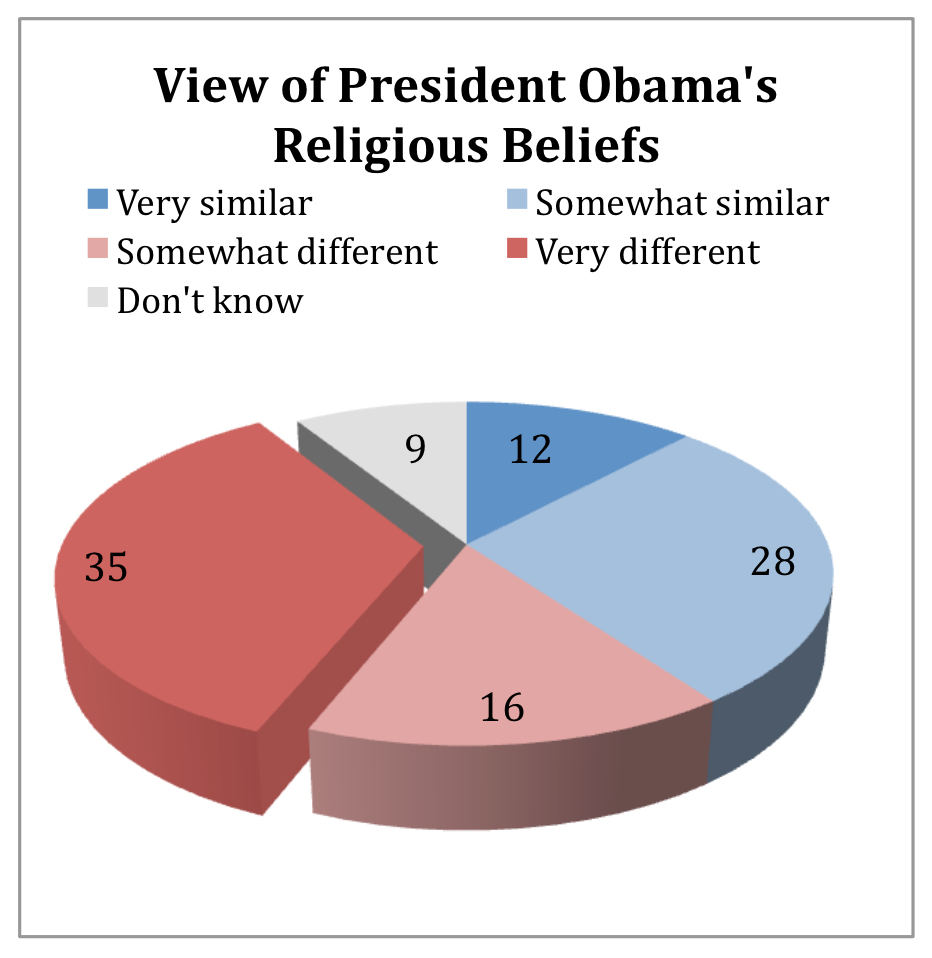 Nearly 8-in-10 (78%) Republicans and a majority (52%) of political independents also say that Obama has religious beliefs that are different from their own. Among Americans who are part of the Tea Party movement, more than three-quarters (76%) say Obama has different religious beliefs, including two-thirds (66%) who say his religious views are very different. Among Democrats, only 1-in-5 say his religious beliefs are different from their own.
Nearly 8-in-10 (78%) Republicans and a majority (52%) of political independents also say that Obama has religious beliefs that are different from their own. Among Americans who are part of the Tea Party movement, more than three-quarters (76%) say Obama has different religious beliefs, including two-thirds (66%) who say his religious views are very different. Among Democrats, only 1-in-5 say his religious beliefs are different from their own.
Seniors (age 65 and older) and Americans with a high school education or less are much more likely to say Obama has different religious beliefs (59% and 56% respectively) than their own, compared to younger Americans (under 30 years of age) and Americans with a college degree (50% and 42% respectively).
Among religious groups, minority Christians are much more likely to say Obama’s religious beliefs are similar to their own than white Christians (60% vs. 36% respectively). Despite Obama’s affiliation with a mainline Protestant church, Catholics are significantly more likely to say Obama has similar religious beliefs than Protestants overall (49% to 40% respectively). In fact, only 4-in-10 white mainline Protestants say the President has similar religious beliefs; a majority (52%) say they are different from their own. White evangelicals are most likely to say the Obama’s religious views differ from their own; nearly two-thirds (65%) say they are different, including half who say they are very different.
There is a strong relationship between how Americans perceive Obama’s faith and their views toward him. Among Americans who say Obama has very similar religious beliefs, 94% have a favorable view of him, including a majority (51%) who have a very favorable view. At the other end of spectrum, Americans who say Obama’s beliefs are very different have decidedly negative views about the President. Nearly 8-in-10 say they have a very (51%) or mostly (27%) unfavorable view of him.
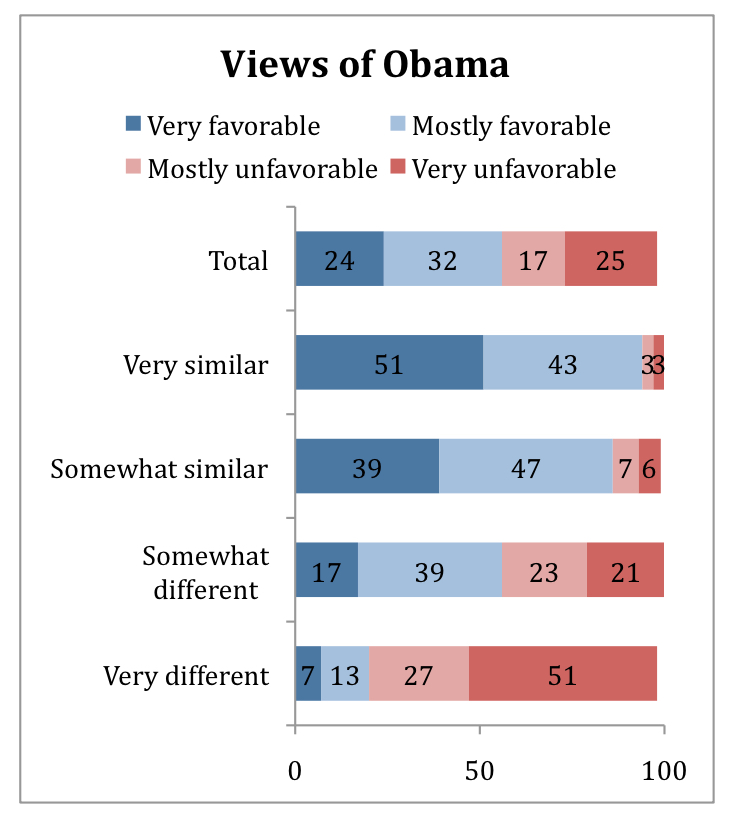 There is a critical difference between Americans who say Obama’s religious beliefs are very different and those who say they are only somewhat different. Among those who say his religious beliefs are only somewhat different, a majority (56%) still have a favorable view of him, although this is significantly lower than among those who see their beliefs as similar to the President’s.
There is a critical difference between Americans who say Obama’s religious beliefs are very different and those who say they are only somewhat different. Among those who say his religious beliefs are only somewhat different, a majority (56%) still have a favorable view of him, although this is significantly lower than among those who see their beliefs as similar to the President’s.
Among Americans who attend religious services more often, views of Obama’s religious faith are more closely linked to evaluations of him. For example, among Americans who attend religious services at least weekly, there is 74-point gap in Obama’s favorability rating between those who say he has similar religious beliefs (92% favorable) and those who say he has different religious beliefs (18% favorable). Among Americans who seldom or never attend religious services, the favorability gap is about half as large. Among this group of less frequent church attenders, nearly 9-in-10 (87%) who say Obama has similar religious beliefs have a favorable opinion of him, compared to 51% of those who say he has different religious beliefs—a 36-point gap.
Approximately 1-in-4 (24%) Americans say that Obama’s religious beliefs guide his decisions a lot, 42% say they guide his decisions a little, and 28% say they do not guide him at all. On this question, there are no significant differences between those who think Obama’s religious beliefs are more or less similar to their own.
Discrimination and Attitudes Towards Minorities
The survey asked a number of questions about discrimination and ethnic minority groups. These questions reveal stark fault lines across many segments of American society generally, and they also reveal important differences between key groups in the Republican coalition.
Discrimination and Gender
Most Americans believe that discrimination is still a problem for women in the U.S., and this belief is widely shared across demographic subgroups. Nearly 6-in-10 (58%) Americans disagree that discrimination against women is no longer a problem in the U.S. Both women and men disagree that women no longer face discrimination in the country, but women are more likely than men to disagree (64% vs. 52%). With the exception of seniors (age 65 and older) who are evenly divided, majorities of every age cohort disagree that women no longer face discrimination. Majorities of every religious group also disagree that women no longer face discrimination. Among political groups, solid majorities of Democrats (67%) and Independents (57%) also disagree, while Republicans are evenly divided. In contrast, nearly 6-in-10 (58%) of those who identify with the Tea Party say discrimination against women is no longer a problem in the U.S.
Discrimination and Race
Less than 4-in-10 (37%) Americans say that the government “has paid too much attention to the problems of blacks and other minorities” over the last couple of decades. Nearly half (47%) of Republicans agree with this statement, compared to only about 1-in-4 (26%) Democrats and about 4-in-10 (41%) independents. Among those who identify with the Tea Party movement, more than 6-in-10 (61%) agree that the government has paid too much attention to the problems of blacks and other minorities.
The survey also asked a question about reverse discrimination: whether discrimination against whites is a significant problem. A majority (54%) of Americans disagree with this statement, compared to 44% who agree. A majority (56%) of Republicans agree that discrimination of whites is as big a problem as discrimination against blacks and other minorities, a view shared by only 28% of Democrats and 49% of independents. Among those identifying with the Tea Party, more than 6-in-10 (61%) say discrimination against whites is as big a problem as discrimination against minorities.
Among religious groups, white evangelicals are the only religious group in which a majority (57%) agree that discrimination against whites has become as big a problem as discrimination against minorities. There are also significant generational divides: only one-third of Americans under age 30 believe that discrimination against whites has become as big a problem as discrimination against minorities, compared to half (50%) of Americans age 65 or older.
GOP Coalition Differences on Issues of Discrimination
Attitudes about discrimination and race divide two groups that are important to the Republican Party: white evangelicals and those identifying with the Tea Party. For example, less than half (46%) of white evangelicals believe discrimination against women is no longer a problem in the U.S., compared to 58% of those identifying with the Tea Party movement. There is a 20-point gap between white evangelicals and those identifying with the Tea Party movement on the question of government assistance to minorities. Approximately 6-in-10 (61%) of those identifying with the Tea Party say minorities have received too much attention from the government over the past few decades, a view shared by only 41% of white evangelicals.
There is more agreement between white evangelicals and members of the Tea Party that discrimination against whites is a serious problem. More than 6-in-10 (61%) of those identifying with the Tea Party movement agree that discrimination against whites has become as big a problem as discrimination against blacks and other minorities, a rate only slightly higher than white evangelicals (57%) and Republicans overall (56%).
Islam and American Values
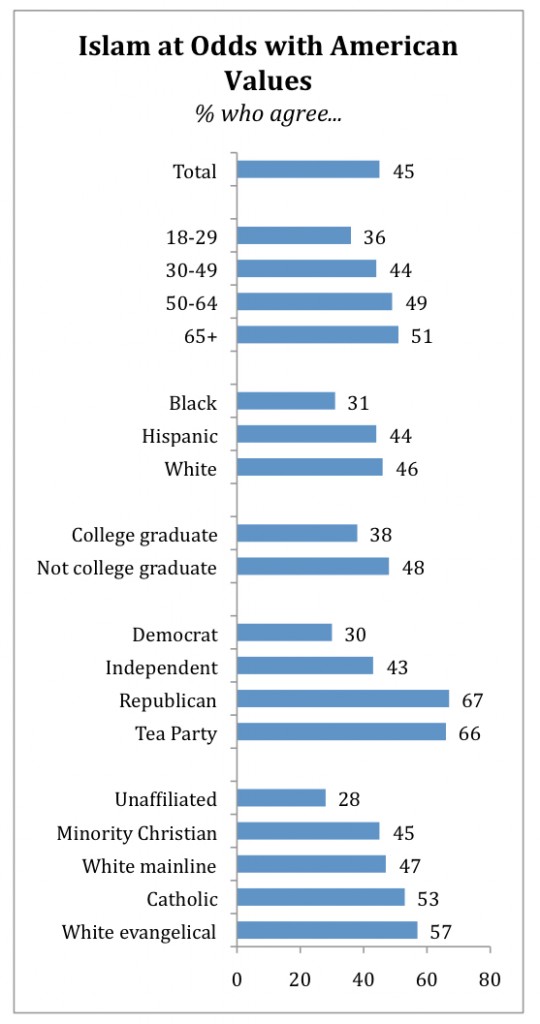 Americans are nearly evenly divided over whether the values of Islam are compatible with American values. A plurality (49%) disagree with this statement, compared to 45% who agree. Differences on this issue run along partisan, religious, educational, and generational lines, but the most pronounced differences are between partisans.
Americans are nearly evenly divided over whether the values of Islam are compatible with American values. A plurality (49%) disagree with this statement, compared to 45% who agree. Differences on this issue run along partisan, religious, educational, and generational lines, but the most pronounced differences are between partisans.
Approximately two-thirds of Republicans (67%) and those identifying with the Tea Party movement (66%) agree that Islam is at odds with American values. Less than one-third of Democrats (30%) agree, and only about 4-in-10 (43%) Independents agree. There is a 15-point gap between seniors (age 65 and older) and younger Americans (under age 30) over whether the values of Islam are at odds with American values (51% vs. 36% respectively). And there is a 10-point gap between Americans without a college degree and college graduates (48% vs. 38% respectively agreeing).
Among religious groups, majorities of white evangelical Protestants and Catholics agree that Islam is at odds with American values (57% and 53% respectively. White Mainline Protestants and minority Christians are nearly evenly divided (47% and 45% agree respectively). Among the religiously unaffiliated, less than 3-in-10 agree (28%) that Islam is at adds with American values.
America’s Place in the World and Foreign Policy
American Exceptionalism
A majority (58%) of Americans agree that God has granted America a special role in human history. Less than 4-in-10 (38%) disagree with this statement. There are significant differences between religious groups over the idea of American exceptionalism.
Among white evangelicals, more than 8-in-10 (83%) believe God has granted a special role for the U.S. Two-thirds of minority Christians also agree, as do smaller majorities of white mainline Protestants (53%) and Catholics (54%). Americans with no formal religious affiliation strongly reject the idea that God has given the U.S. a special role in human history. More than two-thirds (67%) disagree, and a majority (56%) disagree strongly.
Those identifying with the Tea Party movement (76%) and Republicans (75%) are much more likely to believe that God has a granted the U.S. a special role in human history than independents (54%) or Democrats (49%).
Ensuring Peace: Diplomacy Vs. Military Strength
By a significant margin, Americans are more likely to believe that good diplomacy rather then military strength is the best way to ensure peace (59% to 38% respectively). However, there are significant partisan, generational, gender, and racial differences.
A strong majority of Democrats and independents say that diplomacy is the best approach to ensuring peace (78% and 59% respectively). Among Republicans, more than 6-in-10 (61%) say that military strength is the best option to ensure peace. Members of the Tea Party are even more likely to support a foreign policy approach that emphasizes military strength over diplomacy (73% to 26%).
Seven-in-ten younger Americans (age 18 to 29) say that diplomacy is the best approach in foreign policy, compared to 51% of senior Americans (age 65 and older). A majority of both women and men prefer diplomacy to military strength, but women more strongly support diplomacy than men (64% to 53%). Both African Americans (69%) and Hispanics (73%) are also more likely to favor diplomacy than white Americans (56%).
Torture
Americans are divided over whether torture can ever be justified. Half of Americans agree that torture against suspected terrorists in order to gain important information can never be justified, compared to 48% who disagree. Attitudes vary significantly across partisan and religious lines.
More than 6-in-10 (62%) Democrats agree that using torture against suspected terrorists to gain important information can never be justified. In stark contrast, only about one-third of Republicans (36%) and those identifying with the Tea Party (33%) agree. Among those identifying with the Tea Party, nearly two-thirds (65%) disagree, and 35% disagree strongly. Political independents resemble the general population, with half saying torture can never be justified.
Religiously unaffiliated Americans are more likely than religiously affiliated Americans to reject unequivocally the use of torture. Nearly 6-in-10 (57%) Americans with no formal religious affiliation say torture can never be justified, compared to about half of white evangelicals (50%), minority Christians (51%), Catholics (47%), and white mainline Protestants (47%).
Americans who favor foreign policy that emphasizes military strength are less likely than those who disagree to reject the use of torture on suspected terrorists. Among Americans who say that military strength is the best way to ensure peace, only 38% agree that torture can never be justified; 61% disagree.
The Impact of American Exceptionalism on Militarism and Torture
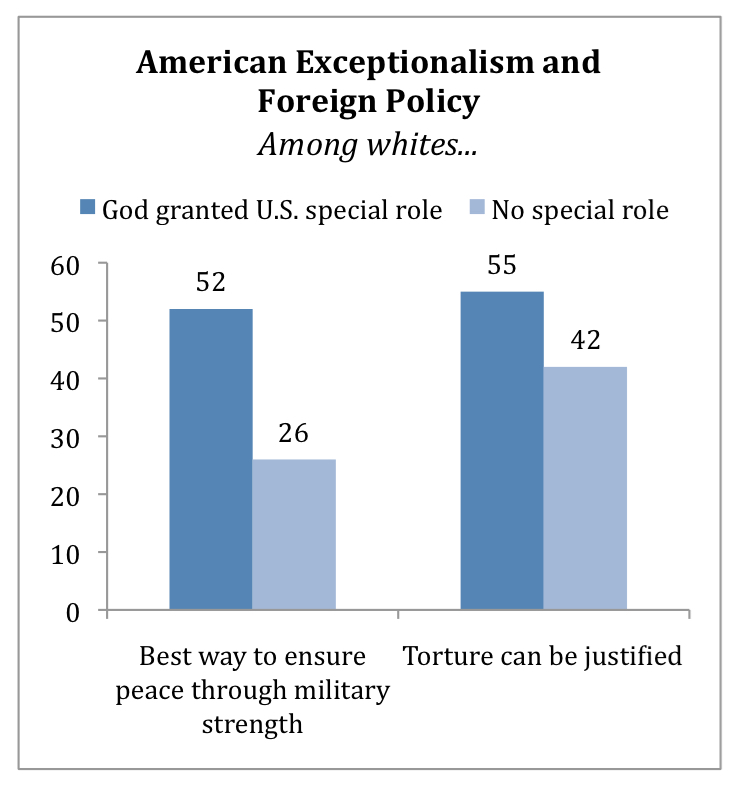 Americans who affirm the idea of “American exceptionalism,” a belief that God has given the U.S. a special role in human history, have a distinctly more militaristic approach to foreign policy than those who do not affirm this idea. Those who believe in American exceptionalism are more likely to favor military strength over diplomacy as the best way to ensure peace, and they are also more likely to say torture can be justified than those who do not believe God has given the U.S. a special role. These differences are especially pronounced among white Americans.
Americans who affirm the idea of “American exceptionalism,” a belief that God has given the U.S. a special role in human history, have a distinctly more militaristic approach to foreign policy than those who do not affirm this idea. Those who believe in American exceptionalism are more likely to favor military strength over diplomacy as the best way to ensure peace, and they are also more likely to say torture can be justified than those who do not believe God has given the U.S. a special role. These differences are especially pronounced among white Americans.
Among white Americans who say God has granted the U.S. a special role in history, a majority (52%) say the best way to ensure peace is through military strength rather than through diplomacy, a rate twice as high as among white Americans who do not affirm American exceptionalism. Similarly, a majority (55%) of white Americans who affirm American exceptionalism say torture can be justified in at least some cases, compared to 42% of white Americans who disagree that God has granted the U.S. a special role in human history.
The Size and Role of Government
Government’s Role in Protecting Morality
By a nearly 2-to-1 margin, more Americans say they worry that the government is getting too involved in the issue of morality than say government should do more to protect morality in society (63% to 33%). There are some minor variations across religious groups, but there is no religious group among whom a majority express support for more government action to protect morality. No more than one-third of Catholics (33%), the unaffiliated (26%), and white mainline Protestants (19%) say government should do more to protect morality. Among white evangelicals and minority Christians, who exhibit the highest support, less than half say government should be more active on moral issues (44% and 46% respectively).
Support for government action on morality also varies somewhat by political ideology, with 37% of conservatives, 32% of moderates, and just 27% of liberals expressing support for government involvement in protecting morality.
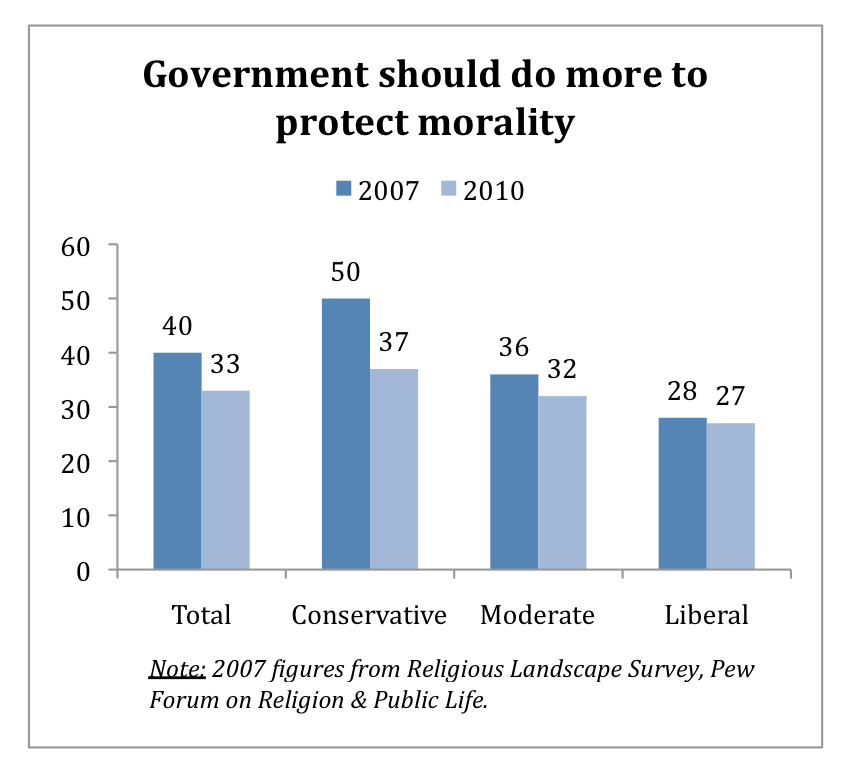 Notably, there is evidence that public opinion on this question may be linked to which administration controls the levers of government, especially for conservatives. For example, support for government action on moral issues has declined significantly since 2007. In 2007, 4-in-10 Americans said government should do more to protect morality—7 points higher than today. This decline in support is almost entirely due to conservatives who have shifted significantly on this question. In 2007, half of all conservatives said government should make greater efforts to protect morality, compared to only 37% in 2010, a 13-point decline. Moderates and liberals shifted only marginally during the past three years, registering 4 point and 1 point declines respectively.
Notably, there is evidence that public opinion on this question may be linked to which administration controls the levers of government, especially for conservatives. For example, support for government action on moral issues has declined significantly since 2007. In 2007, 4-in-10 Americans said government should do more to protect morality—7 points higher than today. This decline in support is almost entirely due to conservatives who have shifted significantly on this question. In 2007, half of all conservatives said government should make greater efforts to protect morality, compared to only 37% in 2010, a 13-point decline. Moderates and liberals shifted only marginally during the past three years, registering 4 point and 1 point declines respectively.
Support for government action to protect morality is closely related to views of President Obama. Among Americans with a very favorable opinion of the President, 4-in-10 say government should do more to protect morality in society, compared to only 28% of those with a very unfavorable view of the President. This link to views of President Obama can be seen clearly among conservatives, who are generally more likely to favor government action on morality. Among conservatives, a majority (51%) who have a favorable view of Obama say government should do more to protect morality, compared to only 30% of conservatives who hold an unfavorable view of the President.
Government vs. Churches and Charities
A majority (52%) of Americans disagree that government is providing too many social services that should be left to religious groups and private charities. Forty-five percent of Americans agree with this statement.
There are significant religious and partisan gaps on this question. White evangelical Protestants are the only group among whom a majority (60%) say the government is providing too many social services that should be left to churches and charities. Less than half of Catholics (48%) and white mainline Protestants (43%) agree. Only 36% of minority Christians agree; 6-in-10 disagree. Among the religiously unaffiliated, less than 1-in-5 (18%) agree.
Across all religious, political, and demographic groups, members of the Tea Party voice the strongest agreement with this statement. More than 8-in-10 (82%) say government is providing too many social services that should be left to religious groups and private charities. Two-thirds (66%) of Republicans also agree. In stark contrast, only 23% Democrats agree. Independents are nearly evenly divided, with 49% agreeing that the government is providing too many social services that should be left to churches and private charities.
Personal Religiosity and Social Problems
A majority (56%) of Americans believe that if enough people had a personal relationship with God, social problems would take care of themselves, compared to 38% who disagree. Americans differ markedly on this question by age, political affiliation, race and religious affiliation. More than two-thirds (68%) of seniors (age 65 and older) agree, compared to just 43% of young Americans (age 18 to 29), a 25-point gap. More than 7-in-10 (72%) African Americans agree, compared to 56% of whites and less than half (45%) of Hispanics. Nearly three-quarters (73%) of Republicans agree that if enough people had a personal relationship with God social problems would solve themselves, compared to 45% of Democrats, a 28-point gap. More than three-quarters (76%) of white evangelical Protestants also share this view, compared to 1-in-4 Americans with no religious affiliation.
Religion, Political Parties, and Candidates
Americans are much more likely to say that Democratic candidates do not pay enough attention to religion (47%) than to say they are too close to religious leaders (28%). Conversely, a majority (54%) of Americans say Republican candidates are too close to religious leaders, while only 27% say they are not paying enough attention to religion.
Pluralities or majorities of every religious group report that Republican candidates are too close to religious leaders. Pluralities or majorities of most religious groups say that Democratic candidates are not paying enough attention to religion. However, religiously unaffiliated Americans say they are more concerned with both parties being too close to religion leaders, although they are much more concerned about Republican candidates (77%) than Democratic candidates (42%) in this regard.
Partisans hold opposite critiques of the other party. Nearly 6-in-10 (58%) Republicans say that Democratic candidates do not pay enough attention to religion; conversely, two-thirds (66%) of Democrats say that Republicans candidates are too close to religious leaders. Independents are not happy with the balance either parties’ candidates bring to the question of religion in public life, although they hold stronger concerns about the Republican Party. Nearly 6-in-10 (58%) Independents say Republican candidates are too close to religious leaders, and a plurality (46%) of Independents say that Democratic candidates do not pay enough attention to religion.
Endnotes
1 2008 vote includes the share of the two-party vote.
Recommended citation:
Jones, Robert P., and Daniel Cox. “Old Alignments, Emerging Fault Lines: Religion in the 2010 Election and Beyond.” PRRI. 2010. http://www.prri.org/research/old-alignments-emerging-fault-lines-religion-in-the-2010-election-and-beyond/.
